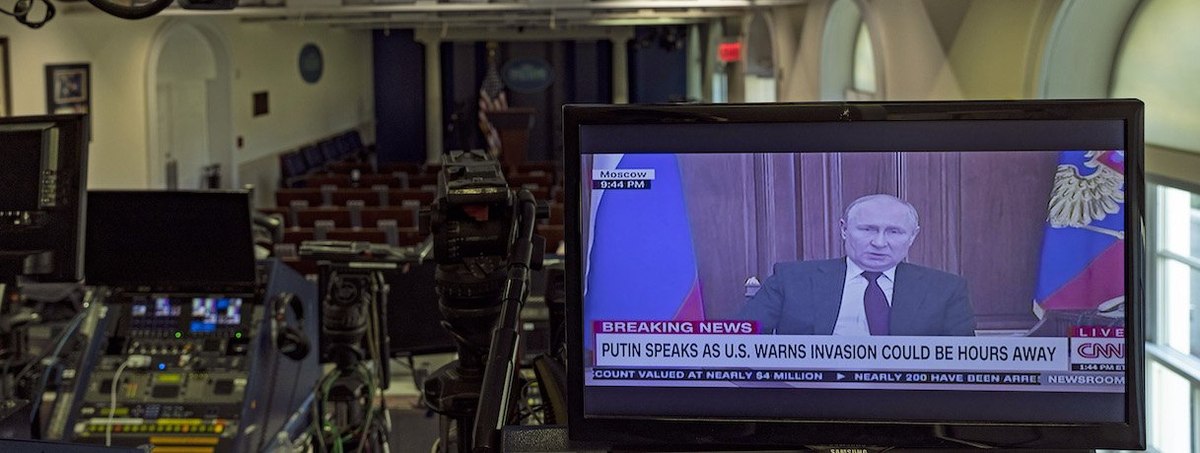Our latest Economist/YouGov Poll was conducted before Russia declared that it recognized the Russian-speaking breakaway parts of eastern Ukraine, but by a margin of two to one, Americans wanted to take a strong stand in support of Ukraine in the conflict, with particularly strong support (more than three to one) for the U.S. placing economic sanctions on Russia, which President Joe Biden announced Tuesday.
More on the latest findings about Americans’ opinion on Russia and Ukraine:
What’s the best course of action? Americans want the U.S. to intervene in the conflict economically, rather than militarily.
Of the seven potential responses polled, both Republicans and Democrats were more likely to say that five were good ideas rather than bad ideas:
- Imposing economic sanctions on Russia
- Sending financial aid to Ukraine
- Allowing Ukraine to join NATO
- Sending troops to NATO ally countries in Eastern Europe
- Sending weapons to Ukraine
Support for imposing economic sanctions on Russia is bipartisan, with 64% of Democrats and 60% of Republicans saying it is a good idea.
There is little support for sending American troops to Ukraine, even if they are not directly engaged in combat. Only 16% think that is a good idea, while by 37% to 31%, the public thinks even sending U.S. soldiers into Ukraine without engaging in combat is a bad idea. Democrats, however, say that would be a good thing to do, by 40% to 28%.
Should America make concessions? Americans aren’t willing to budge on Russian desires in order to prevent an invasion.
By a margin of three to one, Americans support Ukraine joining NATO, which Russian President Vladimir Putin has demanded not happen. Only 16% say it would be a good idea to promise Russia that Ukraine will never join NATO if it meant preventing Russia from invading Ukraine. A similarly small share say that in order to prevent an invasion, it would be a good idea to roll back troop deployments in Eastern Europe (16%), and even fewer support allowing Russia greater influence in former Soviet countries (10%).
Do Americans care about what happens in Russia and Ukraine? Compared to other countries, Americans care a great deal about what happens in Russia and Ukraine, and over half say their fate is closely tied to that of the U.S.
Most (52%) believe that what happens in Russia affects the U.S. a lot, and this week the share saying the same thing about Ukraine rose six percentage points, to 40%.
While Americans were most likely to say that China's fate is closely tied to that of the U.S., Russia was a close second, followed by Ukraine.
How much of a threat does Russia pose to the U.S.? One in four Americans say Russia poses an immediate and serious threat to the U.S., more than any other country polled.
Opinion about Ukraine may be determined more by how the U.S. public views Russia and its leader than by what Americans think of Ukraine: 52% do not have an opinion of the Ukrainian President Vlodymyr Zelensky, though by 30% to 19%, those with an opinion are favorable.
More view Russia as an immediate and serious threat to the U.S. (41%) than say the same about Iran (24%), ISIS (29%), and the Taliban (26%). Only China comes close to Russia on this question: 38% call it an immediate and serious threat.
What does this mean for Biden? The poll suggests that decisive action could improve President Biden’s ratings.
This week, even before his public statement responding to Russian actions, there was a small improvement in the approval of his handling of foreign policy, much of it coming from Republicans. Last week, just 6% of Republicans approved of the president’s handling of foreign policy. That figure jumped 10 points this week.
Overall opinion of Biden’s job performance remains negative (41% approve, while 49% disapprove), and by 52% to 33%, Americans remain uneasy about the president’s ability to handle an international crisis.
See the toplines and crosstabs from this Economist/YouGov Poll
Methodology: The Economist survey was conducted by YouGov using a nationally representative sample of 1,500 U.S. adult citizens interviewed online between February 19 - 22, 2022. This sample was weighted according to gender, age, race, and education based on the 2018 American Community Survey, conducted by the U.S. Census Bureau, as well as 2016 and 2020 Presidential votes (or non-votes). Respondents were selected from YouGov’s opt-in panel to be representative of all U.S. citizens. The margin of error is approximately 3% for the overall sample.













